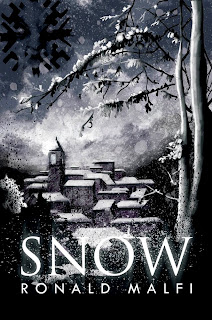
You ever met a person on a date and there was nothing really wrong with them but the conversation never really sparked? Like, the conversation was pleasant and they were attractive and they laughed at your jokes, but a day or so later you look at your cell phone, consider texting them, and go "meh"?
That was my relationship with Relic.

I don't get along well with science.
I really wish I did. I champion reason and logic over superstition and servitude, I love when Neil deGrasse Tyson shows up on The Daily Show, and I have worked in the tech industry for years. You'd think I'd be better at this stuff but when anyone tries to explain anything math or science-y my brain takes a little ADHD journey to the magical land of unicorns and rainbows, where my poet's soul traipses through fields of gilly flowers and there are no scaaaaaary numbers.
Oh hell, I might as well post the whole damned Patton Oswalt bit.
So I wasn't really ready for the whole techno-thriller explosion of the 90s. I did read and love Jurassic Park but that novel had dinosaurs. DINOSAURS! Otherwise, all the books pretty much read the same. There are pages and pages of some expert explaining shit to me, a bunch of non-characters reinforcing whatever the expert explained, some one-off chapters of a dumb ass security guard getting slaughtered, and a bunch of interesting but over-explained action scenes at the end of the novel.
People I know who love science stuff love this book. One of them recommended it to me when we were teenagers (hi, Erica) and I really liked it then, but I couldn't quite seem to get back into it. If it's the sort of book that's right for you, have at it. It's not really my scene.
I did like the bit in the Amazon with all the adventure-scientist cliches. And I loved how ridiculous Agent Pendergast was. He's goddamned clown shoes. I kept forgetting that he was from the Deep South and probably talks like Andy Bernard doing a Southern Accent, because with his highly mannered turn of phrase and unflappability it read like he was one of those stick-in-the-butt British detectives. "I daresay, a lizardman is eating my brain! What a sticky wicket!" Also, he's a goddamned ex-Green Beret! EVERY HERO IN BOOKS IS GODDAMNED SPECIAL FORCES! Is the only career options for former special forces soldiers to star in trashy novels? Romance novels get Navy SEALS and thrillers get Rambo. What ever happened to the poor, unloved infantry? Don't they get cool stories? Or in the wonderful world of fiction everyone who joins the military become forced to take a turn sniping Somali pirates from the back of a Navy ship?
I say this with love. Pendergast and his sidekick D'Agosta were the best parts of the book. They defied authority, strove to protect people, and were fun to watch bumble around failing to find anything.

For all the science in the book, the logic ultimately falls short.
There's a killer in your museum and you continue with the opening? No.
You hire a guy to write a book and you get anal about the very, very minor indiscretions he finds? No.
I'm getting better at spotting the mechanics behind constructing a story and I know when roadblocks are artificially laid down to add conflict to the story. The amount of hostility that the characters encountered from their superiors seemed inflated and artificial. I get that careers are in jeopardy, but there's something in the museum eating people's brains. Come on!

Good story, not my thing.
Also, kothoga is a better name for the monster and Mbwun is a better name for the tribe.















